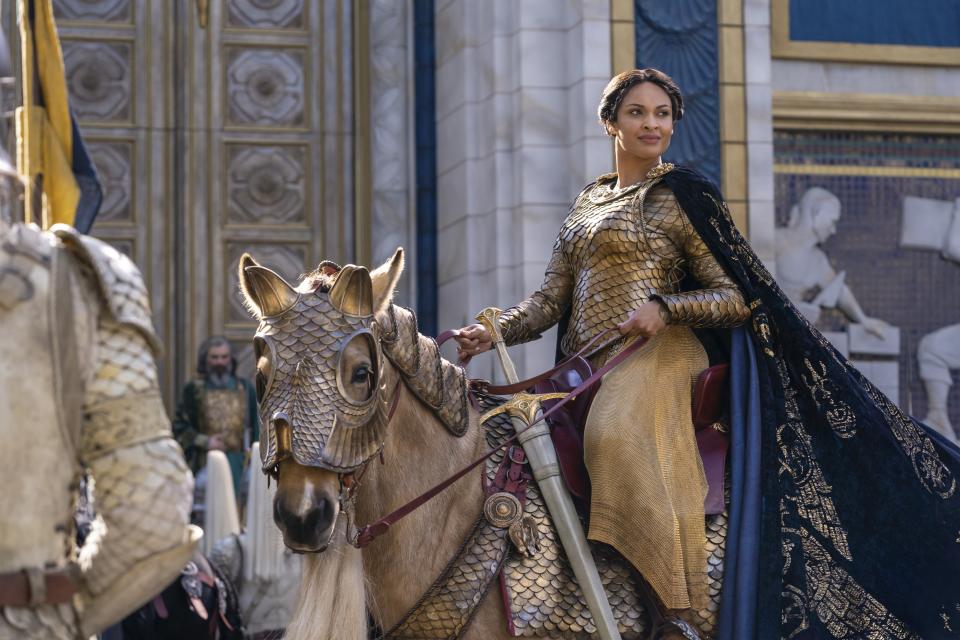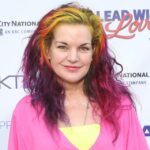Another high-profile Hollywood franchise, another case of online trolls complaining about the film or television show’s inclusive cast.
Amazon’s mega-budgeted The Lord of the Rings: The Rings of Power is the latest tentpole to draw the ire of racist “fans,” following similar uproars in recent years to various Star Wars projects, the recent Game of Thrones spinoff House of the Dragon, Netflix’s The Sandman, upcoming Percy Jackson and Little Mermaid reboots, and on and on and on.
Here’s everything you need to know about our latest bout with toxic fandom.
Why is there an uproar?
Beyond the obvious answer (good ol’ fashioned racism), the justifications for all the vitriol range from precedent to the idea of “faithfulness.” While the casts of Peter Jackson’s previous film trilogies, The Lord of the Rings and The Hobbit, were nearly all white, the prequel series The Rings of Power — based on the appendices of J.R.R. Tolkien’s legendary novels — are far more diverse (even if the majority of the sprawling cast is still white). Black British actress Cynthia Addai-Robinson plays Míriel, the queen regent of Númenor. Puerto Rican actor Ismael Cruz Córdova plays the elf Arondir. British-Iranian actress Nazanin Boniadi plays his love interest, the human healer Bronwyn. Black British actor-comedian Lenny Henry and Sri Lankan actress Thusitha Jayasundera play the harfoots (ancestors of the hobbits) Sadoc and Malva, respectively.
Fans upset with the series’ casting typically claim “historical accuracy,” citing that Tolkien modeled Middle-earth after medieval Britain and other European lands. As The Gamer’s Ben Sledge points out, however, “the assumption that all people in this region were white stems from 19th Century white nationalism in Germany, and later Nazi propaganda.” And, notes The Hollywood Reporter’s Richard Newby, “This ignores the individuals of color who have populated England throughout its history, and that the first modern Britons had dark skin, based on DNA evidence taken from the Cheddar Man, a 10,000-year-old skeleton discovered in 1903.”
Tolkien wrote The Lord of the Rings between 1937 and 1949, a time when people of color were vastly underrepresented in literature and pop culture. Still, though, as the most venerated LOTR resource, TheOneRing.net, has pointed out, Tolkien intentionally never describes race in the books. “I have the hatred of apartheid in my bones; and most of all I detest the segregation or separation of Language and Literature. I do not care which of them you think White,” the author said. Tolkien was a known anti-racist, Newby says.
But perhaps the best response to people upset that a fantasy series released in 2022 doesn’t have an all-white cast came this weekend from former Florida House of Representatives member Omari Hardy: “This is a show about magical rings and elves and dwarves and evil wizards, but what’s unrealistic about it is the BLACK PEOPLE in the cast,” Hardy tweeted.
“I’m not racist, I just care about historical accuracy,” I say about a TV show that includes hobbits and elves.
Above my desk hangs a painting of Jesus, who looks like Bradley Cooper.
— Max Kennerly (@MaxKennerly) September 4, 2022
If you’re mad that there are Black Elves and Black Dwarves in Middle-earth, I have news for you. Middle-earth isn’t real, but you *are* really racist.
— Kyle D. Anderson (@KyleDAnderson) September 4, 2022
Isn’t this just a vocal minority? Why are we feeding the trolls?
It’s absolutely true that as with most cases of racist uproar, the backlash to the backlash is much louder. One CNN article in particular this past weekend, titled “When ‘wokeness’ comes to Middle-earth: Why some say diverse casting ruins the new Lord of the Rings series,” was roundly lambasted on social media. “In this article ‘wokeness’ literally just means ‘black people,’” activist Angus Johnston responded in a viral tweet. “The greatest scam the mainstream media has pulled on us is legitimizing Jim Crow level racism by calling it ‘wokeness,’” wrote Dare Obasanjo. Others complain about giving the trolls a platform.
But this isn’t just 12 angry fanboys tweeting from their parents’ basements. According to Forbes, The Rings of Power’s July trailer had 56,000 likes to 159,000 dislikes (YouTube now hides dislikes, but can be seen with an extension), a startling ratio for a generally beloved franchise. There are other reasons fans are upset: The fact that, unlike LOTR and The Hobbit, Rings of Power is not based on specific Tolkien books, for example, but written with far more liberties taken (albeit with the blessing of Tolkien’s estate) by creators J.D. Payne and Patrick McKay. With a quick scan of the comments and nearly any online forum, however, and you’ll see the mentions of the “diversity police” and “woke Nazis” and “social justice warriors” ruining Lord of the Rings. Even Elon Musk is upset, claiming “Tolkien is turning in his grave,” though his dog-whistling tweets are more critical of the film’s gender dynamics than racial optics (“Almost every male character so far is a coward, a jerk or both,” he sobbed.). Take that all with a few grains of salt, though, considering Musk’s long-running feud with Amazon chief Jeff Bezos.
There’s also been “review bombing” (when hordes of angry fans assign the lowest rating to film or show, sight unseen), another move straight out of the troll playbook. On Rotten Tomatoes, the series has a glowing critical consensus of 84 percent, but only a 39 percent audience approval rating, with THR pointing out the latter has come with complaints about the show’s diversity. Amazon was ostensibly so concerned with review bombing that it outright suspended user reviews for 72 hours on its own platform in an effort to battle online trolling.
What does the cast say?
In interviews with Yahoo Entertainment at San Diego Comic-Con, the Rings of Power cast beamed with pride over both the series’ more diverse and gender-balanced ensemble.
“We’re talking about a global show, and a global audience. This is now the reality. This is not about taking the narrow view,” Addai-Robinson told us. “And to me this is about inviting people in and being expansive. And if you’re going to tell this story in 2022, this to me feels like the only way to tell it, the only way to represent it. And I think people have been really hungry to see full representation in this world. Because at the end of the day this story is all about people of different backgrounds coming together for a common cause.”
“It’s just nice, it’s just such an inclusive atmosphere,” added Megan Richards, who plays the harfoot Poppy Proudfellow. “And I can’t wait for the time when that’s not even a question anymore. It’s just so nice that the modern world that we’re living in today really is reflected within the world that J.D. and Patrick have created.”
Has the racist backlash affected ratings?
There’s a saying among conservative circles when it comes to Hollywood “forcing” diversity on its audiences: “Go woke, go broke.”
And while Amazon invested upwards of $1 billion in obtaining the rights to Tolkien’s works and committing to five seasons, the early returns are thus far promising for the streaming giant.
The Rings of Power’s premiere drew 25 million viewers on Prime Video in its first day, Amazon reported [via Variety].
“It is somehow fitting that Tolkien’s stories — among the most popular of all time, and what many consider to be the true origin of the fantasy genre — have led us to this proud moment,” Jennifer Salke, head of Amazon Studios, said in a statement. “I am so grateful to the Tolkien Estate — and to our showrunners J.D. Payne and Patrick McKay, executive producer Lindsey Weber, cast and crew — for their tireless collaborative efforts and boundless creative energy. And it is the tens of millions of fans watching — clearly as passionate about Middle-earth as we are — who are our true measure of success.”




